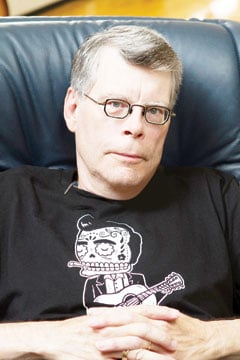Stephen King —
the master of horror fiction
Stephen King is a prolific and immensely popular author of horror fiction. In his works, King blends elements of the traditional gothic tale with those of the modern psychological thriller, detective, and science fiction genres.
King was born on September 21, 1947, in Portland, Maine. When he was two years old, King’s father deserted the family, leaving his mother to care for Stephen and his older brother. By the time King was seven, he had begun writing stories. After discovering a box of horror and science fiction books in his aunt’s house, he discovered his forte. In 1965, his first story was published in Comics Review.
King began working on a novel about a girl with telekinetic abilities entitled Carrie. When it was released in 1974, the book was an instant success and catapulted him into the top ranks of horror writers.
King’s fiction features colloquial language, clinical attention to physical detail and emotional states, realistic settings, and an emphasis on contemporary problems, that lend credibility to the supernatural elements. King’s wide popularity attests to his ability to create stories in which he emphasizes the inability to rationalize certain facets of evil in seemingly commonplace situations.
King’s interest in the demonic and the paranormal is usually reflected in his protagonists, whose experiences and thoughts serve to reveal psychological complexities and abnormalities.
Carrie concerns a socially outcast teenage girl whose emotional insecurities lead her to take violent revenge on taunting classmates by means of telekinetic powers. Other works in which paranormal events recur include In The Shining, Christine, The Dead Zone and Firestarter.
King has admitted to writing five novels under the pseudonym Richard Bachman to avoid over-publishing under his own name. These novels seldom contain elements of the supernatural or occult, focusing instead on such themes as human cruelty, alienation and morality.
He has also written screenplays for several films
The surprising power of reading fiction
Through reading fiction, our imagination blossoms. Literary fiction is an incredible example of art because it allows remarkable room for our own interpretation. Simply put: you’re given a direction, but you create the path. With expanded creativity, you discover new ideas that can take any idea to the next level.
Reading fiction can also provide us a sense of calm in just a few minutes. This could be because as we focus on the emerging plot, our minds begin to wander and relax.
To put yourself in the shoes of others and grow your capacity for empathy, you can hardly do better than reading fiction. Multiple studies have shown that imagining stories helps activate the regions of your brain responsible for better understanding others and seeing the world from a new perspective.
Reading fiction has been shown to put our brains into a pleasurable trance-like state, similar to meditation, and it brings the same health benefits of deep relaxation and inner calm. Regular readers sleep better, have lower stress levels, higher self-esteem, and lower rates of depression than non-readers.
Reading a good novel allows your imagination to take flight. Novels allow you to forget about your day-to-day troubles and to transport yourself to a fantasy world that becomes a reality in your mind’s eye. Rarely is the movie adaptation of a book ever quite as good as the original novel. Even the most advanced special effects will always fall short of the visual power of your own imagination.
Fictional literature can deepen our appreciation for concrete human experience. By retelling life with words, novelists heighten our sensitivity to common human experiences.
Compiled by Usama Rasheed